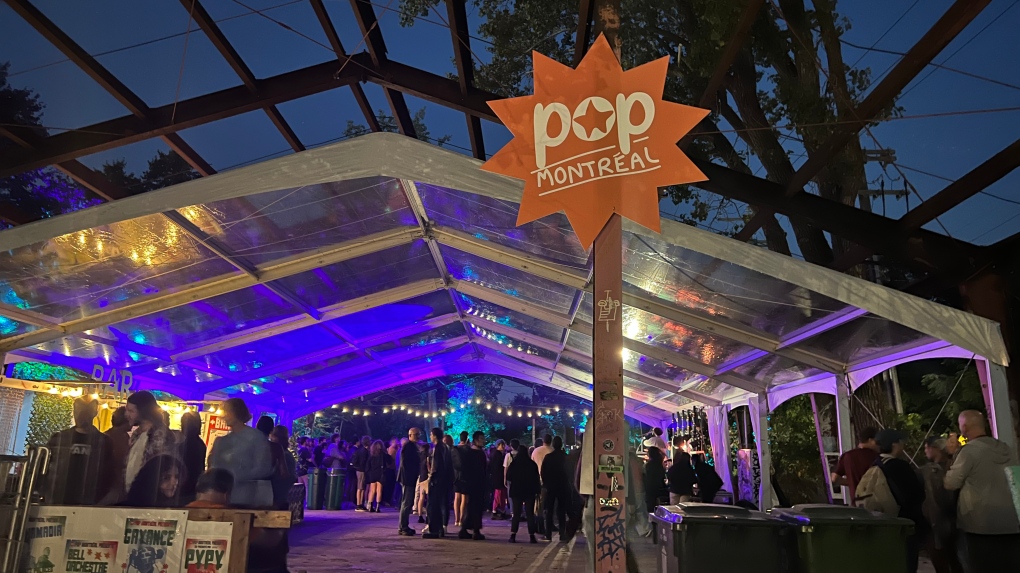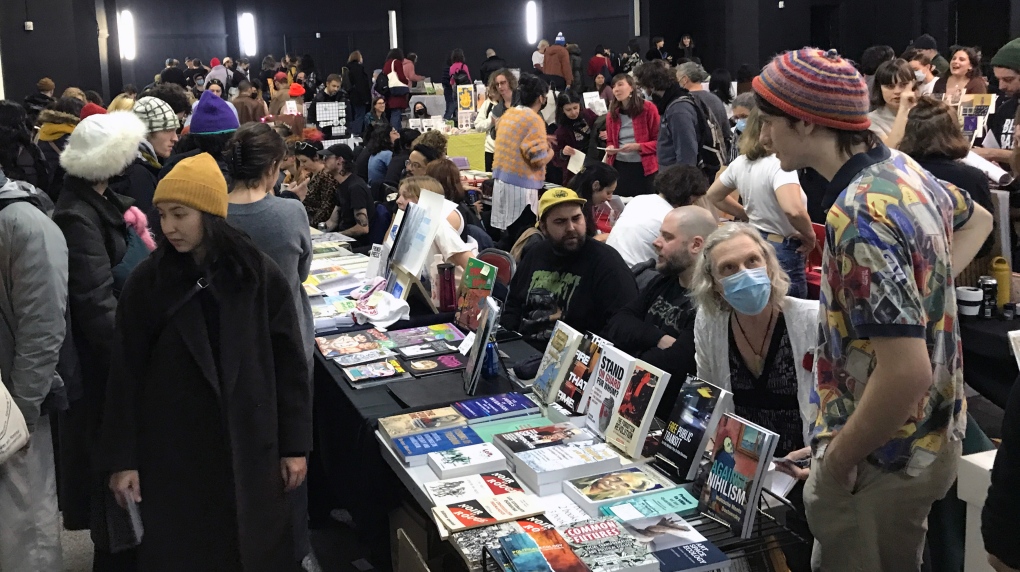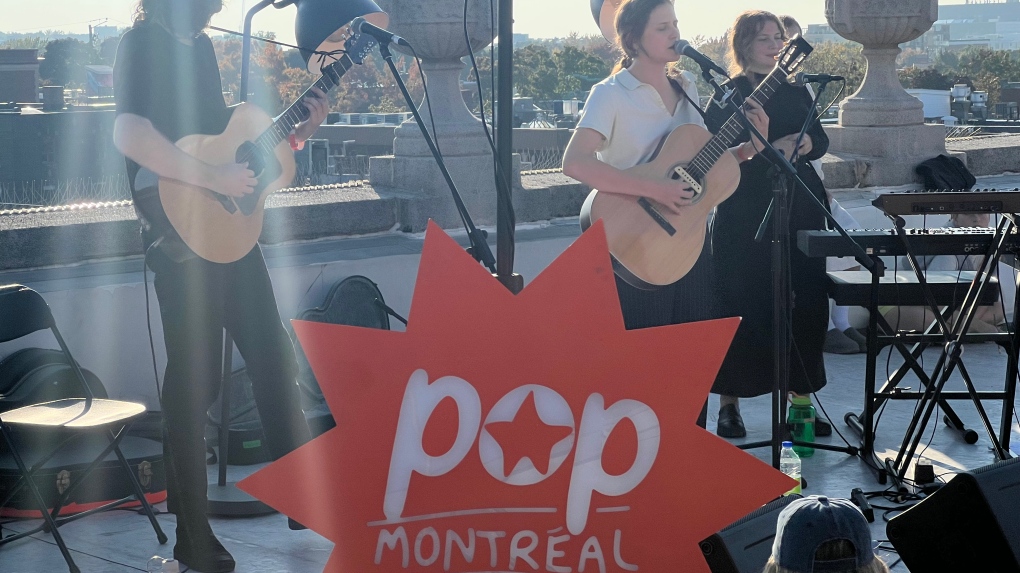Montreal festivals fighting for funding... and their lives
Last week, La Securite played Pop Montreal. It was a rare treat for music fans looking to check out a band that's taking off.
"Since it is our hometown, we try not to play too often, so it is an occasion, this type of festival is fun to make a happening of it," said lead singer and keyboard player Eliane Viens-Synnott.
The band was among the local musicians, writers, crafters, and other artists that were at the festival to gain exposure, sell merch, and maybe catch a label's eye and get signed.
"It is a chance for delegates that are here in scouting mode or discovery mode to kind of discover new bands. We have some people in town that wouldn't discover us otherwise," said Viens-Synnott.
Whereas Osheaga, the Montreal Jazz Fest, and the Festival d'ete de Quebec feature top-40 acts that draw massive crowds, festivals like Pop give music fans a chance to catch up-and-coming bands.
But Pop, like many festivals and fairs in the city, is finding it harder and harder to find funding.
Pop tries to maintain a funding formula where a third comes from public sources, a third from corporate sponsors, and a third is self-generated by ticket sales, concession, and elsewhere.
That formula has become difficult to maintain.
"Over the years, it's been harder and harder to find private corporate sponsorship, especially when you're competing against some of the big guys like the Jazzfest or Osheaga that really target a bigger, larger public," said Pop creative director Daniel Seligman.
 Pop Montreal venue for the 2023 edition. (Daniel J. Rowe/CTV News)
Pop Montreal venue for the 2023 edition. (Daniel J. Rowe/CTV News)
This means that local festivals must rely more on public funds, which are fiercely fought over and often project-specific.
"Which means that you're always applying for grants for specific projects, you're not sure if you're going to get them," said Seligman. "It's a little more precarious. What organizations like Pop Montreal need is better core funding, so you can really plan for a full year to support artists, to properly pay staff."
Pop is far from alone in fighting for funds.
Arcmtl promotes the arts in its flagship small-press fair Expozine in addition to its art book fair Volume MTL, which starts Tuesday.
Co-organizer Louis Rastelli said that the halt in COVID-19 pandemic core funding meant more and more organizations find themselves fighting for the same pre-pandemic-sized funding pie. In addition, with high interest rates and inflation, organizers are asking for a bigger piece of that pie.
"I call it the Hunger Games model; for one to succeed another must die," said Expozine and Volume MTL co-organizer Louis Rastelli.
 Visitors peruse titles at the annual Expozine zine fest in Montreal. SOURCE: ARCMTL
Visitors peruse titles at the annual Expozine zine fest in Montreal. SOURCE: ARCMTL
Expozine did not get the grant it was hoping for from the Canada Council for the Arts this year, and the grant for Volume only arrived two weeks before the fair was about to start.
"Had we known in June, we would be doing a much better job of spending that money," said Rastelli.
The Canada Council for the Arts told CTV News that organizers are asking for more money and that more requests are coming in while the council's budget remains static.
"Currently, the Council is aware of how the Canadian economy is impacting the arts sector and continues to support the development of a sustainable arts sector," the council told CTV News in a statement.
The City of Montreal changed its festival funding program in 2022 and some organizations have complained that it has resulted in lost funding.
The Carrifiesta was cancelled in May after the city denied its $30,000 funding request.
Mayor Valerie Plante admitted that the city is looking at improvements to its funding formula.
"We will analyze how it went, and we already said that with some festivals that didn't get the same amount of money, we want to accompany that, making sure that the process but also all the accountability mechanisms are in place because that's also important for us so that Montrealers money goes to the right place and is spent well," said Plante.
Another issue for organizers is timing.
Rastelli said that in the past, the Canada Council guaranteed a three-month turnaround on applications.
That is no longer the case, and many organizers find out at the last minute that funding is approved.
In the arts, it's not always possible to plan years in advance due to the nature of the industries.
"In our case for the book sector, the publishers don't know what books are coming out in two years," he said. "They want to promote the one that's coming out in the next season."
In addition, the deadline for festival funding from Montreal is in the fall. This works well for summer festivals but not those like Pop, Volume or Expozine.
"They do that because the priority is for summer festivals to get that in," said Rastelli. "By spring, they have their answers, their money, but for us, that means that while we're in the middle of doing our fall programming, we're supposed to submit this huge demand."
For the artists who rely on festivals and fairs throughout the year, fairs and festivals sometimes account for a huge chunk of their revenue.
Marine Maugeais launched Atelier MM in 2021 and had a table at the Puces Pop MTL market.
Without pop up markets, fairs and festivals, her business would take a major hit.
"I would say 90 per cent of my selling is from the markets and not from my website," she said.
For those who run the festivals in Montreal, something has to change fast.
"It wouldn't shock me to see some of the organizations not being able to survive in the next two or three years," said Seligman.
 Helena Deland plays on the Rialto rooftop at Pop MTL on Saturday, Sept. 30, 2023. (Daniel J. Rowe/CTV News)
Helena Deland plays on the Rialto rooftop at Pop MTL on Saturday, Sept. 30, 2023. (Daniel J. Rowe/CTV News)
"There's just a misunderstanding of how it works... There's only so long that we can go on like this. It's really not an efficient way to spend that arts funding," said Rastelli.
The loss of any festival in the city is, for the artists and organizers, the loss of a piece of what makes Montreal the vibrant city of culture that it is.
"Montreal's a big, small city where musicians, a lot of them know each other. It's a nice community, and playing Pop Montreal makes you feel like you're part of a community," said La Securite guitarist Melissa Di Menna.
CTVNews.ca Top Stories

opinion Tom Mulcair: Prime Minister Justin Trudeau's train wreck of a final act
In his latest column for CTVNews.ca, former NDP leader and political analyst Tom Mulcair puts a spotlight on the 'spectacular failure' of Prime Minister Justin Trudeau's final act on the political stage.
B.C. mayor gets calls from across Canada about 'crazy' plan to recruit doctors
A British Columbia community's "out-of-the-box" plan to ease its family doctor shortage by hiring physicians as city employees is sparking interest from across Canada, says Colwood Mayor Doug Kobayashi.
'There’s no support': Domestic abuse survivor shares difficulties leaving her relationship
An Edmonton woman who tried to flee an abusive relationship ended up back where she started in part due to a lack of shelter space.
opinion King Charles' Christmas: Who's in and who's out this year?
Christmas 2024 is set to be a Christmas like no other for the Royal Family, says royal commentator Afua Hagan. King Charles III has initiated the most important and significant transformation of royal Christmas celebrations in decades.
Baseball Hall of Famer Rickey Henderson dead at 65, reports say
Rickey Henderson, a Baseball Hall of Famer and Major League Baseball’s all-time stolen bases leader, is dead at 65, according to multiple reports.
Arizona third-grader saves choking friend
An Arizona third-grader is being recognized by his local fire department after saving a friend from choking.
Germans mourn the 5 killed and 200 injured in the apparent attack on a Christmas market
Germans on Saturday mourned the victims of an apparent attack in which authorities say a doctor drove into a busy outdoor Christmas market, killing five people, injuring 200 others and shaking the public’s sense of security at what would otherwise be a time of joy.
Blake Lively accuses 'It Ends With Us' director Justin Baldoni of harassment and smear campaign
Blake Lively has accused her 'It Ends With Us' director and co-star Justin Baldoni of sexual harassment on the set of the movie and a subsequent effort to “destroy' her reputation in a legal complaint.
Oysters distributed in B.C., Alberta, Ontario recalled for norovirus contamination
The Canadian Food Inspection Agency has issued a recall due to possible norovirus contamination of certain oysters distributed in British Columbia, Alberta and Ontario.


































